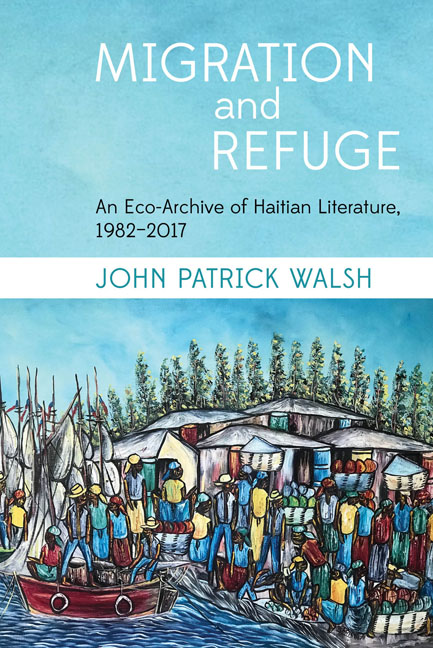Book contents
- Frontmatter
- Contents
- Acknowledgments
- Introduction: Tè glise, Continents à la dérive: Haiti between Shifting Continents, Past and Present
- Part I The Eco-Archive
- Part II Literary Witnesses
- Part III The Anthropocene from Below
- Epilogue Land and Seas of Migration and Refuge, Past and Present
- Bibliography
- Index
3 - The Banality of Disaster
- Frontmatter
- Contents
- Acknowledgments
- Introduction: Tè glise, Continents à la dérive: Haiti between Shifting Continents, Past and Present
- Part I The Eco-Archive
- Part II Literary Witnesses
- Part III The Anthropocene from Below
- Epilogue Land and Seas of Migration and Refuge, Past and Present
- Bibliography
- Index
Summary
An archive may be largely about ‘the past’ but it is always ‘re-read’ in the light of the present and the future.
Stuart Hall, “Constituting An Archive,” 92As an archive in the dual sense articulated above – a collection of documents and a creative process that makes sense of the present by revisiting the past – the texts examined in Part One understand history as an invisible border of fluid temporalities and ever-changing environments. Published during the transition from the late stages of the Duvalier era to the Aristide years, they attest to environmental and ecological dimensions of historical migrations of Haitians. The principle of the archival function continues to inform the historical frame of this second section. In the transition from Part One, the eco-archive lives on, reread and updated, in the works of succeeding generations. To borrow from Stuart Hall, it is a “‘living archive,’ whose construction must be seen as an on-going, never-completed project” (“Constituting An Archive,” 89). Hall is influenced by Foucault's understanding of the discursive boundaries of the heterogeneous materials of the archive, which, as I reviewed above, are marked by the play between rupture and continuity. Hall adds a diasporic perspective, focusing in part on the question of origins and locations, to underscore the inherent incompleteness of archives. He writes:
It is impossible to describe an archive in its totality. The very idea of a ‘living archive’ contradicts this fantasy of completeness. As work is produced, one is, as it were, contributing to and extending the limits of that to which one is contributing. It cannot be complete because our present practice immediately adds to it, and our new interpretations inflect it differently. An archive may largely be about ‘the past’ but it is always ‘re-read’ in the light of the present and the future … (“Constituting An Archive,” 91–92)
Much like Jean-Claude Charles, whose protagonist in Manhattan Blues proclaimed that history always begins somewhere else, Hall draws on Walter Benjamin's concept of jetztzeit, or the constellation of past and present of the “now-being.” The danger, as Benjamin forewarned and as Hall recalls here, is to imprison the past in a single idea in the name of forward progress. As Hall conceives it, archiving is to contribute to a collection within a given cultural authority but also to contest it with a view to the future.
- Type
- Chapter
- Information
- Migration and RefugeAn Eco-Archive of Haitian Literature, 1982–2017, pp. 105 - 138Publisher: Liverpool University PressPrint publication year: 2019

